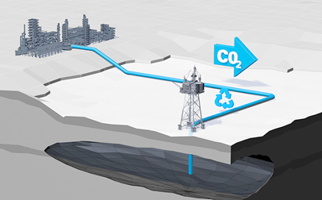
- Operator sanctioned for breach of venting consent at Buzzard field
- Since 2022 the NSTA has imposed £825,000 in financial penalties for flaring and venting breaches
- NSTA urges operators to ensure compliance with regulations
A sixth North Sea operator has been fined for excessive flaring or venting in the past two years as the industry regulator continues its crackdown on those who breach agreed limits.
The North Sea Transition Authority (NSTA) has imposed a penalty of £125,000 on CNOOC Petroleum Europe Limited for venting without consent at its Buzzard field, 60 miles north-east of Aberdeen, on two separate occasions in the space of a fortnight.
The NSTA has now issued fines totalling £825,000 for flaring or venting consent breaches since late 2022.
It is crucial that licensees comply with regulatory obligations to show they are operating their assets responsibly and assist the UK’s move towards net zero – safeguarding public and investor confidence in the sector.
Flaring and venting make up about one-fifth of the UK oil and gas industry’s offshore production emissions. While some flaring and venting is unavoidable for safety and operational reasons, more must be done to reduce the amount of gas being emitted via these processes.
The NSTA has kept a sharp focus on this area. The “OGA Plan” for emissions reduction and tougher guidance published in 2021 require licensees to seek ways of shrinking their carbon footprints, including from flaring and venting.
It also recently wrote to operators to warn them that from 1 January 2025, £500,000 is the new starting point for considering fines relating to breaches of flaring and venting regulations.
As part of its approach, the NSTA closely scrutinises operators’ flaring and venting consent applications, pushes back against requests to raise limits, and uses its sanction powers to deal with suspected breaches.
On 31 May 2022, CNOOC detected a leak in the line which supplies fuel needed to keep the flame lit on Buzzard’s flare stack. CNOOC shut off the fuel line and began venting excess gas into the atmosphere unignited.
The company confirmed to the NSTA on 1 June that it had breached the annual consent for Buzzard, only to continue venting until a fault with a generator led to production operations shutting down on 3 June.
Despite being fully aware that it did not have a valid consent for additional venting, CNOOC restarted production and export activities from Buzzard on 9 June, then further venting took place due to a faulty valve on the fuel gas system. CNOOC continued to produce, and therefore vent, through to 13 June.
Between 31 May and 13 June, CNOOC exceeded its annual venting limit for Buzzard by a total of 435.13 tonnes of gas. A revised consent was granted on 14 June, bringing Buzzard back in compliance for any further venting during the rest of 2022.
The company cooperated throughout the investigation and introduced measures to prevent recurrences, including improved monitoring and a new approach to consent applications. Previously, CNOOC had only requested consent to vent minimal volumes of gas, as venting was uncommon on Buzzard.
Jane de Lozey, NSTA Director of Regulation, said:
“North Sea operators have taken up the challenge of cutting flaring and venting, almost halving emissions from these processes since 2018. However, at a time when the industry is competing for investment, and its commitment to the energy transition is under intense scrutiny, it is vital that all operators remain vigilant on emissions.”
Notes to editors:
Venting is when natural gas – primarily methane – is emitted directly into the atmosphere without combustion. Flaring is when excess gas is burned off, mainly resulting in CO2 emissions.
For further information please contact:
Tel: 07776 548196


